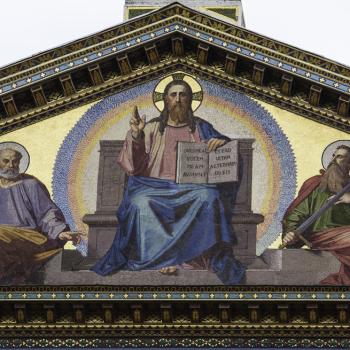
The Christian faith presents the great, transcendent mystery of God, a mystery which is includes God’s loving relationship with us. Human language cannot properly express the fullness of the truth, but it can point to it. We can be directed to where it is to be found. We can, as it were, apprehend it, but we can never comprehend it. That apprehension, however, does allow us to have access to the truth, and through that access, to discern how some falsehoods stand in contrast to the truth. And in this fashion, likewise, we can engage the truth and express it with words, but we must always do so accepting the limitations of our words and not try to take them overly literally or as absolutes. They are, at best, conventions which we use to try to make sense out of that which is beyond us, conventions which serve as metaphors to help us represent the truth which we have apprehended. Not understanding this point is how and why many people make grave mistakes in their interpretation of Scripture; they want Scripture to somehow represent a way in which the transcendent truth is comprehended in human terms, so that every word, every story in it, must be taken literally. Paul, understanding some would make such a grave mistake and misinterpret his implied meaning if they took what he said too literally, warned his audience not to do so by saying: “I am speaking in human terms, because of your natural limitation” (Rom. 6:19a RSV).
Paul knew his audience. He knew their background. He lived in the same culture and cultural situation as they did; he could and would use it to help him point to the insight he wanted them to attain. Sadly, if people read him without understanding that, they might think he fully accepted his cultural situation. He did not. He accepted quite a bit of it, as anyone who lives in a particular time and place takes much which happens around them for granted. But he also understood the limitation of any culture, and so, any expression of the truth based upon cultural situations and norms. Thus, when he pointed out he was speaking in human terms, with the limitations contained within such speech, that included the cultural norms which he used. And in this case, he was talking about our relationship with sin and God, saying that we will be a slave (or servant) to sin until we find ourselves freed from that bondage and then become a servant or slave of God: “having been set free from sin, have become slaves of righteousness” (Rom. 6:18 RSV).
It is easy to see how this could be, and often is, misconstrued. Our ultimate relationship with God is not that of slave/master, but as friends or children (cf. Jn. 15:15; Jn. 1:12) But we can understand the intent of Paul if we do not take the metaphor literally. The point is that God frees us from the dread service and destruction which sin brought upon us, but in doing so, we find ourselves in a relationship with God, one which has its own expectations which we must fulfill. Sin, easily, can be said to be a slave-lord, as it limits our potential, destroying us, leading us to a dead-end with all kinds of bad habits which we cannot break through. Grace frees us from that bondage and gives us a new context, a new situation, one which we have not been accustomed to, one which allows us to follow our original nature and the goodness connected to it, so that, instead of willing to sin, we will to do what is good, and not just willing to do what is good for us in a very particular fashion (in the way sin traps us), but to aim for the greater good, to give ourselves over to it. As we are not used to this new situation, Paul compared what happens to us in it with our experience with sin, showing us that there is a kind of service which is brought out of us. The difference, and why the word slave ultimately fails to apply in the new situation, is that when we are freed from the bondage of sin, we act with freedom, something which sin and its slavery does not allow us to do. Our service is one freely chosen, as it is chosen out of love. It does not hinder or diminish us like slavery does, but rather, it is a service which makes us greater, freer, the more we embrace it. Thus, we must be careful when reading Paul and not think that he wants us to believe that God thinks of us and treats us as slaves, and so, as a consequence, think slavery could be seen as a good. Paul was clear: he was speaking and explaining a transcendent truth with a human convention. He addressed his audience with concepts they understood to help point them to a truth which lay beyond their comprehension, a truth which likewise, lies beyond our comprehension as well (but because of our different cultural situation, would be best addressed with a different convention). The difference between slavery and loving service can be best shown in the difference between what slavery to sin produces in comparison to its alternative. Sin leads to death and destruction, so its slavery leads to our detriment, while God, and service to God, leads to eternal life and our preservation and good:
But now that you have been set free from sin and have become slaves of God, the return you get is sanctification and its end, eternal life. For the wages of sin is death, but the free gift of God is eternal life in Christ Jesus our Lord (Rom. 6:22-23 RSV).
Paul knew he was using metaphors to make his point. He used conventions which he and his audience understood. The slave-master relationship was a significant relationship in his day. It was difficult, indeed, it is difficult, to express how service out of love leads one to gain, instead of lose freedom. This is why Jesus made it clear that our ultimate relationship with God is not that of a slave, but as friends and children of God. The more we embrace God and the love which God has for us, the more we will act out of love and the way of love, the way of loving-service. The more we embrace the way of love, and the grace which it gives, the more we will see our enslavement to sin decline, and eventually, vanish.
Therefore, it is important to realize that Paul did not always agree with the cultural norms of his time. Indeed, he made it clear that what was important was not some sort of legalistic expectation, some cultural norm which must be followed, but what best represented the freedom God gave us in Jesus. He found it difficult, indeed, impossible to do so without using conventions coming from the culture he lived in. He used what was available to him in his day and age. While many could, and did, interpret that as meaning he accepted the structure of the society he found himself in, so that, for example, he accepted slavery, that reading is not one which is compatible with the kind of freedom he said God intended us to have. Indeed, with his relationship with Onesimus, it seems he supported the liberation of slaves, though he knew he could not enforce it, and so he had to deal with and engage society as it was, slowly working for its improvement, and with it, the realization of the truth which he was pointing to with his human words and the cultural norms represented by them.
Stay in touch! Like A Little Bit of Nothing on Facebook.
If you liked what you read, please consider sharing it with your friends and family!
N.B.: While I read comments to moderate them, I rarely respond to them. If I don’t respond to your comment directly, don’t assume I am unthankful for it. I appreciate it. But I want readers to feel free to ask questions, and hopefully, dialogue with each other. I have shared what I wanted to say, though some responses will get a brief reply by me, or, if I find it interesting and something I can engage fully, as the foundation for another post. I have had many posts inspired or improved upon thanks to my readers.












